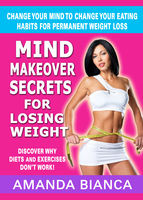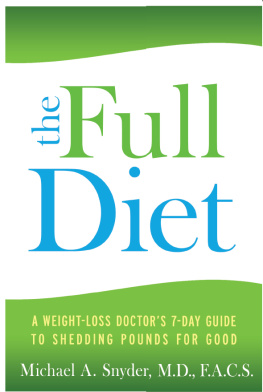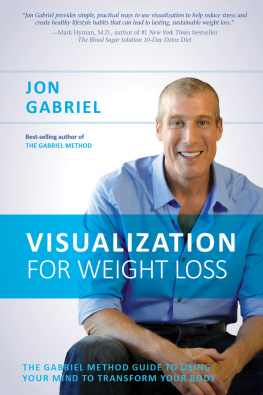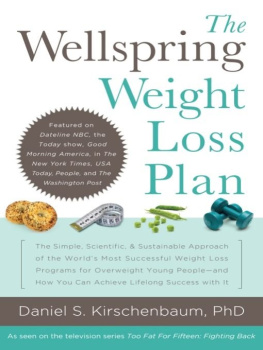

Copyright 2014 by Daniel S. Kirschenbaum, PhD, ABPP
All rights reserved. No portion of this book may be reproduced or transmitted in any form whatsoever, including electronic, mechanical or any information storage or retrieval system, except as may be expressly permitted in the 1976 Copyright Act or in writing from the publisher.
Requests for permission should be addressed to:
New Horizon Press
P. O. Box 669
Far Hills, NJ 07931
Daniel S. Kirschenbaum, PhD, ABPP
Athlete, Not Food Addict: Wellsprings Seven Steps to Weight Loss
Cover design: Charley Nasta
Interior design: Scribe Inc.
Author photo courtesy of kidsinthehouse.com
Library of Congress Control Number: 2013947757
ISBN-13 (eBook): 978-0-88282-465-9
New Horizon Press
18 17 16 15 14 1 2 3 4 5
AUTHORS NOTE
T his book is based on the authors research, understanding of the science of weight management, clinical work and personal experiences. In order to protect privacy, names have been changed and identifying characteristics have been altered except for contributing experts.
For purposes of simplifying usage, the pronouns him/her and s/he are sometimes used interchangeably. The information contained herein is not meant to be a substitute for professional evaluation and therapy.
DEDICATION
To the 20,000 parents and grandparents who trusted the author and his colleagues in Wellspring to help their overweight children, teens and young adults transform their lives. We have honored that trust and aspired to earn it every day over these past ten years.
TABLE OF CONTENTS
My drug of choice is food.
Im a compulsive overeater.
Im an emotional eater.
I know I have to accept the fact that Im a food addict before I can hope to lose weight and keep it off.
I crave chocolate. I have to have my chocolate fix every day. I know it doesnt make sense because Im really overweight, but nothing else will do.
E very day in the media and daily life you can hear overweight people talking about the addiction that they believe controls them, an addiction to food. You may be one of them, someone who believes you face overcoming an addiction in order to become a successful weight controller. Some overweight people do indeed face such a challenge. Eating food, particularly certain kinds like sugary foods, can hijack the brain and make weight control difficult, especially for some people. However, thats not the case for the vast majority of overweight people. In this book, you will learn a different conceptone that will empower you to change.
Most weight controllers are not food addicts; they are athletes. Weight controllers face what is essentially an athletic challenge. All athletes must battle the resistance of their bodies to run faster, play harder and get better. In a remarkably similar way to the biological challenges faced by athletes, weight controllers must fight their bodies resistance to lose weight and keep it off. This perspective on the weight controller-athlete, focused on in this book, can become a truly motivating force for good.
EXAGGERATION ABOUT THE FOOD ADDICT
Unfortunately, the fifty billion dollar diet industry thrives on misinformation, like the idea that all overweight people are food addicts. They spin it out to millions, ensuring confusion and fueling desperation among those seeking slimmer and healthier bodies.
Some Questionable Questions
Will eight glasses of water help me lose weight?
Should I take omega 3 fatty acid pills?
Do cashews make the perfect snack?
Is there magic in blueberries? Soy? Juicing?
Will diet sodas kill brain cells?
Are boot camp trainers the way to slim down?
Can an ab roller roll away belly fat?
Is the solution between my ears?
Low carb?
Low fat?
Mediterranean?
Am I a food addict?
Every day we read and hear in the media that food is a drug. Some claim that food is the drug of choice for overweight people and that all overweight people binge eat in order to cope with their emotions. This ostensible addiction causes and maintains obesity and is the toughest of them all. You can give up alcohol or cigarettes or heroin forever, but you have to keep eating, dont you?
In this book I use science to debunk the myth that almost all overweight people can become addicted to food and that addiction causes and maintains obesity. You and I will consider the meaning of addiction applied to weight problems. If you believe that you are a food addict, then that belief may engender a feeling of hopelessness about the possibility of succeeding. After all, this addiction notion implies that youre battling a force more powerful than yourselfa very strong, biologically anchored addiction, a force that controls you. Well review the substantial evidence that shows that you control your own fate as a weight controller and that its time to free yourself from the belief that your emotional problems cause your weight problems.
The argument against the food addict myth (for the vast majority of weight controllers) comes from many years of published research, all of which will be summarized clearly. Most definitions of dependence or addiction to a substance require several elements. These elements include the development of tolerance to the effects of the substance and powerful withdrawal symptoms when withdrawing from the substance. Food does not produce these effects. A pint of high-fat ice cream consumed today does not lead to gorging on two pints tomorrow, even among people who identify themselves as carbohydrate addicts. Research also shows relatively immediate improvements in moods and no withdrawal sickness, as soon as overweight individuals begin a healthy weight-controlling regimen.
Well also discuss the fact that challenges the food addiction notion most directly. That is, very few obese people binge eat consistently. How can frequent binge eating cause obesity if most obese people do not binge eat? This perspective gains even more traction when realizing that causes other than consuming food compulsively definitely cause weight problems (e.g., genetics; our obesogenic culture; sedentary living).
ATHLETES, NOT FOOD ADDICTS
After challenging the impact of food addiction for most weight controllers, youll discover the many advantages of considering yourself an athlete, not an addict. First and foremost, youll learn that losing weight requires you to overcome your bodys resistance to losing that weight. Youll read about the five major ways in which your body thinks it is protecting you from starvation by making it incredibly difficult to lose the pounds and maintain that weight loss. Then, well focus on the parallels between attempts to lose weight and all other athletic challenges. The bodies of athletes resist getting faster, stronger and better. Thats why athletes train so hard and so consistently to succeed.
Youll learn more about how athletes succeed by reading about the science of expert performance. This research shows that almost everyone believes that talent helps athletes succeed far more than it actually does. The evidence, youll be surprised to see, favors one of baseball great Willie Mays favorite sayings: The harder I work, the luckier I get.
Some examples from the research on expert performance will, I believe, help convince you of the power of learning versus inherited talent. You might expect most child prodigies to become expert performers as adults. These children can play piano or golf (or do other remarkable things) at incredibly high levels when most other children still struggle to tie their shoes. Yet, the research shows that most of these prodigies do not become experts as adults. Also, the vast majority of expert adult performers were never prodigies as children. Many expert musicians, for example, show early interest in music, but they become experts by getting instruction early in their lives, practicing a great deal and gradually developing exceptional skill.
Next page









